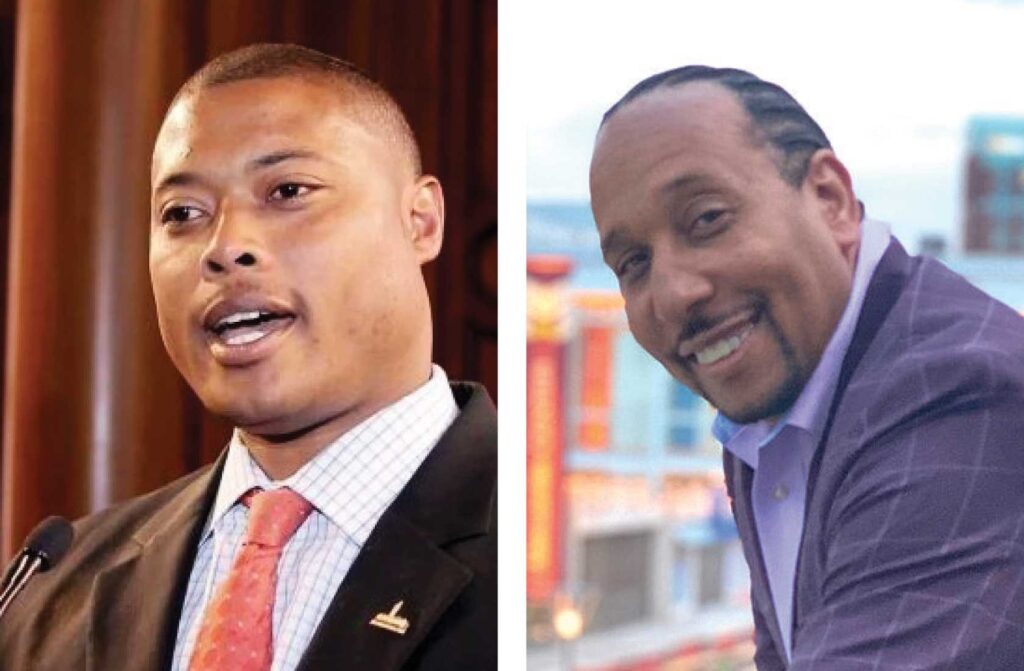Black candidates fall short in three major Mass. mayoral races
With second-place finish, Khrystian King becomes first Black vice chair of Worcester City Council

Black candidates lost mayoral races to white incumbents in Worcester, Brockton and Springfield, three of the state’s largest cities.
Like Boston, the three cities have never elected a Black mayor. The challengers who tried to undo that record in the Nov. 7 election were Khrystian King in Worcester, Fred Fontaine in Brockton and Justin Hurst in Springfield.
In Worcester, King, an at-large City Councilor trailed Mayor Joseph Petty in a field of five candidates, capturing little more than a quarter of the votes.
Despite losing, King’s concession speech on election night celebrated the seats he did win. As the second highest vote-getter, he will continue to serve on the city council and will also act as its vice chair, effectively the city’s vice mayor, starting in January.
“In a historic election, you have standing before you the first Black vice mayor in the history of Worcester,” he said. “Message sent. Message received.”
Former Boston city councilor and mayoral candidate Tito Jackson said King’s continued role in Worcester’s government will allow him to maintain focus on top local priorities. King made housing and affordability key parts of his campaign.
“He’s still in government, and so these issues still get to be aired and pushed at that level,” Jackson said. “There are some amazing economic projects going on in Worcester, there are many great things going on there, and the importance of those things is they affect everybody and not just some people.”
The Brockton race saw Fontaine, a small-business owner, challenge Mayor Robert Sullivan. If elected, Fontaine would have served as the first Black mayor of a city where Black residents make up the largest share of the population.
Fontaine lost the race by a large margin, securing about a third of the votes compared to Sullivan’s 64%.
An earlier Black candidate for mayor, Jass Stewart, came closer to unseating another white incumbent in Brockton, pulling 44% of the vote in 2005 and 47% in 2007.
The city’s shifting demographics — residents of color are a solid majority — could offer an opportunity for greater political power, if voters banded together, Jackson said.
“I think there’s an opportunity in Brockton for coalition-building to ensure that communities who are facing many of the same realities begin to work together to coalesce and ensure that their issues are put forward,” Jackson said, pointing to local issues like financial challenges facing the city’s public school district, which is overwhelmingly composed of Black and Latino students.
Springfield’s race saw City Councilor Justin Hurst lose to Mayor Domenic Sarno by almost 15 percentage points. The race, at the end, was complicated by allegations of vote-buying, with video footage appearing to show representatives of the Hurst campaign paying homeless voters $10 after casting their ballots. Hurst claimed the allegations were a smear campaign by Sarno.
In a series of posts on the social media platform X, formerly Twitter, Hurst, whose fourth term on the Springfield City Council ends in January, called the race a movement, not a moment, and encouraged his supporters to continue to stay engaged, despite the loss.
“And so, I urge all of you — don’t tune out, don’t turn off, don’t turn away. PLUG IN,” he wrote. “Join a club, committee, or neighborhood civic council. Coach, mentor, share, engage, empower, believe, build, ORGANIZE. Get involved and stay involved. We will never stop fighting to make our city the best it can be. Let’s continue to show up for each other.”
Jackson said the three races illustrate the benefits of incumbency, like name recognition and better fundraising. In all the races, the incumbent mayor raised about two times or more than that of other candidates. In the Brockton race, Sullivan raised three times more than Fontaine did.
“I think if you look at all of these races across the board, there tends to be a financial disparity in the ability for Black candidates to raise funds, so this is an area where, as a community writ-large, we need to continue to work on,” Jackson said.
Both Springfield and Worcester saw higher voter turnout than in 2021, the last off-year election. In Worcester, turnout was almost 22%, up from about 16.5% two years ago. In Worcester it was up almost 9 percentage points to just shy of 19%, compared to 10% in 2021.
Jackson said he sees the increased turnout as an indicator that voters in the state are realizing that local elections can have greater on-the-ground impact.
“We are finally coming to a time where people understand the government that actually touches them directly, affects their lives on a daily basis, is local government,” he said. “When it comes to what’s happening with their children’s schools, when it comes to the potholes in the streets, or whether or not there’s a stop sign, or whether there is violence in your neighborhood or community, that form of government that is most connected to the people is the local government.”
Considering the races, Jackson said they mark the importance of diverse leadership across levels of government in the state.
“Massachusetts is not only Boston, so it’s critical that we see leadership at the Gateway city level, not only in city government, but also in the legislature,” he said.
But he said the mayoral elections, with King earning the seat as council vice chair and Hurst securing more than 40% of the votes, also show a changing landscape in the state.
“I do think you’re starting to see, across the state of Massachusetts, viable campaigns that are bringing up and voicing the issues that BIPOC communities need, want, and deserve when it comes to going to polls,” Jackson said.






